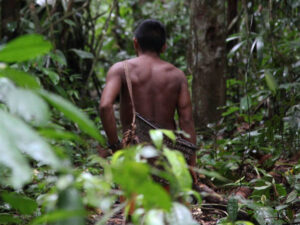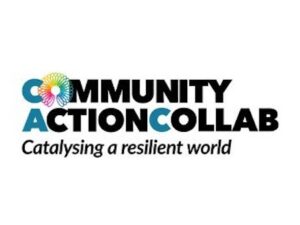
An interview with a shaman in the Amazon rainforest
The Amazon Conservation Team works in partnership with Indigenous people of tropical South America to conserve the biodiversity of the
The International Center for Transitional Justice supports accountability for mass atrocity and human rights violations. Listening to victims and putting their needs at the center is core to the mission.
Fernando Travesí of the International Center for Transitional Justice spoke with Jessica Kantor on February 14, 2023. Click here to read the full conversation with insights highlighted.
Jessica Kantor: Can you introduce yourself and describe the problem that you are addressing and how you’re responding to it?
Fernando Travesí: My name is Fernando Travesí. I’m the executive director of ICTJ, International Center for Transitional Justice. What we are trying to address are breaking the cycles of violence that generate violations of human rights. We see very often that countries relapse in conflict or civil war or violent conflict, and they create massive human rights violations and an endless number of victims. What we try to address is breaking the cycles of violence to lay the ground for sustainable peace and justice. How we address that is by making sure that in any transition from conflict to democracy or from war to democracy, there is justice and accountability for the violations of human rights. What does that mean? It means not only holding the perpetrators accountable, but it also means providing the victims the rights to justice, to truth and reparation and guaranteeing the conditions of non-recurrence.
Jessica Kantor: Who’s directly benefiting from your work?
Fernando Travesí: The direct beneficiary of this work are the victims themselves, individuals who have suffered violations of human rights, meaning displaced people, refugees, victims of sexual and gender-based violence, victims of torture, illegal arrest, extrajudicial killings. There are so many different violations that happen in the contexts where we work that the victims that are demanding justice from the very first moment the violation occurs are the direct beneficiaries and the people we serve and work with. As an organization we work based on consultation with victims, elevating victims’ voices to different levels in order to achieve justice. They are the direct beneficiaries, whether they participate in a trial or they participate in reparation processes, in truth seeking, truth-telling processes or different types of redress, but I would say that the beneficiary is also the society itself, because by doing these processes, you strengthen or build the rule of law system. You promote the protection of human rights and the democratic values, so the society at large is also a beneficiary of this work.
Jessica Kantor: How do you get in touch with your beneficiaries, or how do they find you?
Fernando Travesí: We have a lot of programs in the countries where we work. We have teams on the ground. We have a lot of partners with whom we work in order to get in touch or to receive the victims. We base our work in consultation with and participation of those victims. The processes are designed for them, therefore, we work on the ground. We invest a lot of time in building relationships, creating trust relationships, contacting, listening and learning in order to support the design and the implementation of justice processes.
Jessica Kantor: What makes your approach distinctive?
Fernando Travesí: I think what is distinctive is that first of all, we invest a lot of time in building relationships and learning and listening and consulting with the victims. I think it’s also distinctive because we have a vocation for long-term engagement. In the countries where we work, we understand these processes are very long, and justice is not achievable in one day or one week or one year. It always requires a long engagement. We are there to stay for a long time, but we also know when to move out if we see we are not bringing an added value. I think that we also bring a broader understanding of justice to these situations. An understanding of justice that is not only about criminal prosecution and punishing the perpetrators, but we bring into the picture a broad understanding of justice that is focused on the victim’s rights. I think that’s very unique.
Jessica Kantor: Do you have an example that illustrates the impact of your work?
Fernando Travesí: Colombia is a country that has very recently gone through a peace negotiation after more than five decades of conflict, and I think that peace negotiation has been unique and distinctive because of the victim’s participation and how the peaceful agreement of that very long war has included justice and accountability mechanisms to materialize victims’ rights. We’ve worked a lot towards that, supporting different victims groups, civil society groups, and also the government during the war negotiations. I think that has set a new standard of victims’ rights in peace negotiations worldwide.
Jessica Kantor: How exactly are you measuring success?
Fernando Travesí: That is a very interesting question, and that is an open debate because I think justice needs to be measured by mixing different indicators. Sometimes quantitative indicators, and you can look at the numbers of reduction of the crime, the number of sentences, the number of cases, the number of reparations that have been delivered, the number of victims that have participated in a process. That is one objective quantitative indicator, but there needs to be a lot of space for measuring qualitative indicators, measuring what the perception of justice is. What is the reconciliation process that has been established in a society? Has it made any progress or not? How are we restoring the trust relationships between the citizen and the state or among the citizens themselves? That is more of a perception, and that is more about the role that democratic values and the respect for human rights play in our social mindset. That is also an indicator we need to collect and we need to put in. In brief, you need to mix quantitative and qualitative indicators in order to make sure that you have a full picture that justice has been delivered and is perceived as it has been delivered.
Jessica Kantor: Based on that, what evidence do you have that you are making progress?
Fernando Travesí: We do have a lot of qualitative information that we collect in the implementation of our programs. We do a lot of focus groups. We do a lot of in-depth interviews. We do a lot of baselines at the beginning of the processes in order to be able to measure what the evolution of those processes is. That requires investments, time and tools that you have to implement throughout the process. Then there are also interesting ways of identifying unintended impacts by using measurement techniques that allow you to collect impact from analyzing media, analyzing public opinion, and analyzing some other indicators that are less related to the justice process itself, but that you can see the impact in other spheres of the society.
Jessica Kantor: Do you have a specific insight or a teachable lesson that others can take from your work and learn from what you’ve done?
Fernando Travesí: One of the tips is not to replicate. It’s always to try to learn from lessons that have happened before ours, but then try to come up with a unique solution that is tailored to that context. Replicating or copycatting, and then using something that has been useful in a given context doesn’t guarantee success in a different context. That is a mistake that we often make because we try to replicate or to think success is what works there works somewhere else. I think the tip is to invest the time to reflect, analyze, consult, and listen, and learn from other experiences. When you have all that knowledge and experiences in your mind, you work with your problem in your context to find something that is culturally appropriate, that is feasible, that is respectful to the victims, that you can guarantee victims’ participation and that you can have some impact, even if it is small, but you make some progress to something bigger. Go in small and be very attentive to the context in order to work with something that is useful for them.
Jessica Kantor: Every social innovator learns from things that haven’t worked as much as from things that have. What are some choices that maybe you or the organization made early on that you learned lessons from?
Fernando Travesí: In all this work, most of the organizations are driven by a vision. Sometimes we need to implement that vision in a given context with a limited capacity. Sometimes there is a very tight space to make decisions that might not be the right ones, but they were the possible ones. I try to be gentle on that reflection, not to punish ourselves about decisions in the past, but learning from them. Sometimes organizations are not independent enough because maybe they don’t have the resources to keep engagement in some countries or they deal with problems of protracted conflict that require years and years of engagement. Sometimes you have to move away because you are not able to mobilize the resources to continue the engagement and then you have to retreat. I think every organization has had to move away from problems they wanted to continue working on, but they didn’t have the resources. That is something that shouldn’t happen, and we should all work together to prevent that from happening.
Jessica Kantor: Do you have an example of that for your organization?
Fernando Travesí: You can see many times that, for instance, there are conflicts that take all the attention, all the resources and all the funding, and then you have forgotten conflicts that are still there that nobody thinks about or a few people think about, but they are less visible. Afghanistan is a great example of that, how everyone has moved on from Afghanistan. We’ve done a lot of work and we try to continue engaging and supporting organizations and human rights activism victims there, but it’s very difficult because the attention has shifted away to other conflicts. Legitimately, but I wonder how we can shift and distribute our resources and attention to all the conflicts, not to have forgotten conflicts. Syria is another forgotten conflict, badly affected by an earthquake now on top of a 10 year war. We continue working, but it’s very difficult and I wish we were able to do more.
Jessica Kantor: Separate from what you’ve just said, what are some other challenges or limitations that you find that your organization currently has? Aside from raising funding, which is an issue that everybody has.
Fernando Travesí: There is a problem of access in many countries. The problem of getting access to the ground because sometimes there are logistical challenges, sometimes security challenges and sometimes political constraints, those are very big barriers that all organizations face in some countries where we work.
Perhaps all organizations need to be better on the technology front. We need to be better equipped to face the digital challenges of the century and how we use technology and digitization as a peace building tool to protect human rights instead of the current predominant use of technology that is eroding democracy and being a tool for avoiding accountability or even for violations of human rights. I think as a movement, we need to catch up on that and be more equipped and to include that in our thinking and our analysis, to be more digital in the work that we do because the world has changed and we need to include that dimension. I don’t think all the organizations have yet.
Jessica Kantor: Are you working to advance systems level change in your field?
Fernando Travesí: Oh, yes. All the work that we do is focused on changing systems that have created or perpetuated or allowed human rights violations or marginalization or structural exclusion. Those things in the countries where we work are not the result of one individual intervention. They are the result of a system that has created that massive criminality. Our work is targeted to dismantle those systems and to create a new system in the society that guarantees human rights instead of violating them, that protects human rights of everyone and not only the human rights of some. System change is part of the work that we do because we understand justice in this context not as the persecution of an individual, but ultimately, the change of the system that has enabled or allowed the commission of the human rights violations.
Jessica Kantor: How specifically are you working on that right now?
Fernando Travesí: In every country, you have to understand how the system has allowed or perpetrated human rights violations, and then you have to engage in, for instance, institutional reform, changing laws, increasing transparency and accountability of institutions, debating and asking for a consultation for a new constitution. There are many countries in which the debate is exactly how do we change the system of this country for everybody to be included. I think that is the case of many countries where we are working, and that’s the case, just to mention some of them, Syria, Libya, Yemen, even Colombia to a different stage is also a national conversation about a new system of the country in different ways. As I said, it’s part of the work that we do.
Jessica Kantor: What do you think is most needed from the other people, the other organizations, the other actors that are working to advance systems level change?
Fernando Travesí: I think we all need to work in partnerships. We all need to complement each other and to generate strong alliances, to be able to bring together the different types of expertise that we all have and to put them together for a broader plan. Some organizations working on the education sector or on the health system, they need to be working together with justice organizations as ours, if what we want is to change the system. I think increasing alliances and partnership is the only way forward.
Jessica Kantor: How do you see your work evolving in the next five years?
Fernando Travesí: I see evolving to incorporate that technology I was talking about before, just to be more digital in the way that we think and the way we work. Evolving the work in a way that the rights of the victims are part of the public agenda in a predominant way in order to hold accountable the individuals or the systems that have created those violations. We’ve seen that in topics like racial justice, justice for indigenous population, for systemic exclusion or marginalization, that the victims of those systems are demanding more and more justice solutions that bring a change in the system. I think that is more and more part of the agenda, and it’ll be even more in the next five years.
Jessica Kantor: Do you have any specific examples that you want to share of maybe a particular case or particular group of people who have benefited from your work?
Fernando Travesí: Yes, I was talking of the global level and the national level, but you can just go down into the community level and then see how victims, for instance, of sexual and gender-based violence in Uganda, children that have been born out of rape during the war and they didn’t have a birth certificate and therefore, they didn’t have access to any kind of public service. We’ve worked to make the authorities understand that it is a justice issue to provide those individuals with a birth certificate no matter what was the condition of the birth, because there were families that rejected the women because they were the victim of a violation and therefore, the children were not recognized by the community or the family.
That is a very deep micro injustice situation that we’ve worked with our Ugandan team to resolve and to make progress on that. There are some other examples in which victims of communities that were massacred during the Colombian War have received… They are perpetrators in what was called by the Truth Commission Public Acknowledgement of Responsibility Events in which there has been a very powerful dialogue between the victims and the perpetrators responsible of those acts and they’ve asked for forgiveness and they’ve been exposed to the harm they created to the victims. That has been very reparative for the victims themselves. If a war is about destroying human dignity, and it happens in a second, the process of rebuilding that human dignity takes years. It’s full of micro examples, but you can find many to get inspiration and to continue working.
Jessica Kantor: Is there anything else that you feel is really important to add to this conversation for anybody who’s looking to learn from what you’ve done and what your organization has done?
Fernando Travesí: I would say that it is important, no matter what the field you work in, for every organization or social entrepreneurs to keep a justice lens, a justice approach to the work they do. To understand charity philanthropy from a justice perspective, which is basically acknowledging and recognizing the full dignity of the individual and all their human rights. The right to education, the right to help, the right to justice, the right to live in peace, the right to have a job. I think a rights-based approach, it’s very important because I think it connects very well with the individuals that we are working for, and I think it sends a message that what we are doing is we are fighting for justice. It’s a nuanced approach, but I would recommend everybody to think from a human rights based approach and a justice approach.
Click here to read the full conversation with insights highlighted.
Jessica Kantor is an independent journalist specializing in health, human rights, and social impact. Her work can be found in Fast Company, Healthcare Quarterly, The Las Vegas Review-Journal, and others. She is a living kidney donor.
* This interview has been edited and condensed.
Learn about other social innovations focusing on holding accountability for human rights violations.


The Amazon Conservation Team works in partnership with Indigenous people of tropical South America to conserve the biodiversity of the

Founded during the outbreak of the COVID-19 pandemic, Community Action Collab is a platform where partner organizations can coordinate disaster

Community health workers have been key to negotiating treatments of diseases, particularly among communities that don’t accept clinical medicine. Spurred

Imperative 21 works to reimagine the relationship between the private sector, government, and civil society to improve outcomes for the

Jennifer Pahlka founded Code for America, an organization that provides human-centered design tech solutions to government services. Now they have

SOCAP brings together social entrepreneurs, investors, foundation and nonprofit leaders, government and policy leaders, creators, corporations, academics, and beyond –